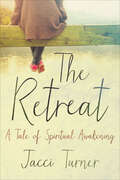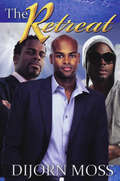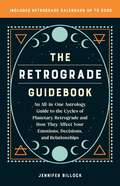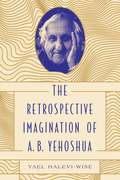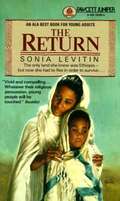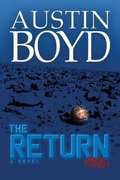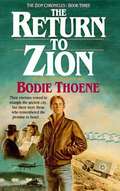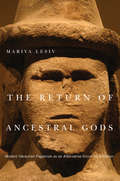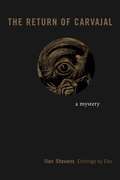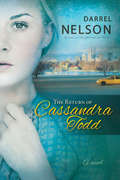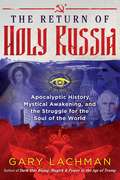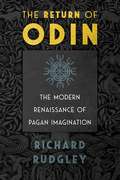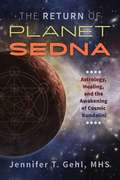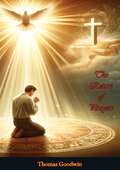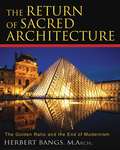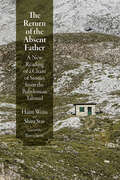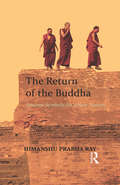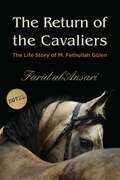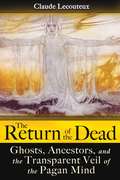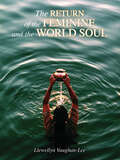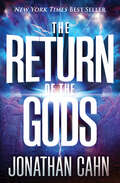- Table View
- List View
The Retreat: A Tale of Spiritual Awakening
by Jacci TurnerA week at a retreat becomes a transformational journey of faith renewal for a young Christian suffering a crisis of the soul in this poignant, illuminating, and spiritually wise teaching novel for fans of Jen Hatmaker, Shauna Niequist, and Brene Brown.For her entire life, Amy considered her evangelical Christian upbringing the foundation of her life and beliefs. But when she stands up for her gay best friend, Amy is ostracized and banished from the church she loves—resulting in a crisis of the spirit that causes her to doubt her conservative upbringing as she enters her thirties. Seeing Amy's pain, a caring friend raises the money to send her on a week-long retreat for contemplative activism, hoping that a few days of quiet reflection will help her rekindle her faith.At the retreat, Amy meets two women her age-teachers who introduce her to new types of prayer—as well as Celeste, a seasoned church mentor who takes Amy under her wing and gently shows her new ways to practice her religious beliefs. In the course of just a few days, Amy finds an inspiring and more meaningful view of God.
The Retreat: Men After God's Own Heart
by Dijorn MossFor those who have ever wondered what goes on at a men's retreat, author Dijorn Moss gives readers an in-depth look into the lives of four men who have looked for answers in all the wrong places . . . until now. Quincy is in the beginning stages of his divorce, but he still wants to know which church member had an affair with his wife. Jamal is on the verge of the promotion of a lifetime, but unresolved issues with his son, Jamir, threaten everything. Chauncey is a man who will go to great lengths for his church, but not for his terminally ill brother. Will is a young hustler who has been given a rare opportunity to make a choice that will change his life forever. These four men are all at a crossroads in their lives. Will they lay their burdens down at the cross, or will they choose paths that will cause more harm than good? It will all be revealed at the men's retreat, where they learn that they need God and his wisdom more than ever.
The Retrograde Guidebook: An All-in-One Astrology Guide to the Cycles of Planetary Retrograde and How They Affect Your Emotions, Decisions, and Relationships
by Jennifer BillockGo beyond the stereotypes of mercury retrograde and dig deep into the planetary cycles, discovering how they can affect your everyday life from day to day and year to year.Every planet except Earth goes into retrograde at some point, and each planet has its own bundle of joys and pain points that come with it. The Retrograde Guidebook aims to take the mystery out of planetary retrogrades, providing an overview of what retrograde means astrologically and its basic principles. It offers a breakdown of every planetary retrograde&’s function and effects—and why three main celestial bodies, the Earth, sun, and moon, don&’t ever go into retrograde. You&’ll also learn how planetary retrogrades will affect you as an individual, tips on coping with resulting effects, and how to maximize the benefits so the planets work on your behalf to improve your life. The Retrograde Guidebook includes calendars through 2030. These calendars include the dates each planet goes into and out of retrograde, and the astrological signs each planet is leaving and entering. Don&’t get caught unawares—with all the information this guidebook arms you with, you&’ll never fear a retrograde again!
The Retrospective Imagination of A. B. Yehoshua (Dimyonot)
by Yael Halevi-WiseOnce referred to by the New York Times as the “Israeli Faulkner,” A. B. Yehoshua’s fiction invites an assessment of Israel’s Jewish inheritance and the moral and political options that the country currently faces in the Middle East. The Retrospective Imagination of A. B. Yehoshua is an insightful overview of the fiction, nonfiction, and hundreds of critical responses to the work of Israel’s leading novelist.Instead of an exhaustive chronological-biographical account of Yehoshua’s artistic growth, Yael Halevi-Wise calls for a systematic appreciation of the author’s major themes and compositional patterns. Specifically, she argues for reading Yehoshua’s novels as reflections on the “condition of Israel,” constructed multifocally to engage four intersecting levels of signification: psychological, sociological, historical, and historiosophic. Each of the book’s seven chapters employs a different interpretive method to showcase how Yehoshua’s constructions of character psychology, social relations, national history, and historiosophic allusions to traditional Jewish symbols manifest themselves across his novels. The book ends with a playful dialogue in the style of Yehoshua’s masterpiece, Mr. Mani, that interrogates his definition of Jewish identity.Masterfully written, with full control of all the relevant materials, Halevi-Wise’s assessment of Yehoshua will appeal to students and scholars of modern Jewish literature and Jewish studies.
The Retrospective Imagination of A. B. Yehoshua (Dimyonot: Jews and the Cultural Imagination #9)
by Yael Halevi-WiseOnce referred to by the New York Times as the "Israeli Faulkner," A. B. Yehoshua’s fiction invites an assessment of Israel’s Jewish inheritance and the moral and political options that the country currently faces in the Middle East. The Retrospective Imagination of A. B. Yehoshua is an insightful overview of the fiction, nonfiction, and hundreds of critical responses to the work of Israel’s leading novelist.Instead of an exhaustive chronological-biographical account of Yehoshua’s artistic growth, Yael Halevi-Wise calls for a systematic appreciation of the author’s major themes and compositional patterns. Specifically, she argues for reading Yehoshua’s novels as reflections on the "condition of Israel," constructed multifocally to engage four intersecting levels of signification: psychological, sociological, historical, and historiosophic. Each of the book’s seven chapters employs a different interpretive method to showcase how Yehoshua’s constructions of character psychology, social relations, national history, and historiosophic allusions to traditional Jewish symbols manifest themselves across his novels. The book ends with a playful dialogue in the style of Yehoshua’s masterpiece, Mr. Mani, that interrogates his definition of Jewish identity.Masterfully written, with full control of all the relevant materials, Halevi-Wise’s assessment of Yehoshua will appeal to students and scholars of modern Jewish literature and Jewish studies.
The Return
by Sonia LevitinFifteen-year-old Desta belongs to a small, isolated mountain community of Ethiopian Jews. She and her brother and sister leave their aunt and uncle and set out on the long and dangerous trip to freedom -- an airlift from the Sudan to Israel, the Promised Land. They travel barefoot, facing hunger, thirst and bandits. "Vivid and compelling. . . Levitin's tour de force is sensitively written. " BOOKLIST. An ALA 1987 Best Book for Young Adults.
The Return (Mars Hill Classified Series, Book #3)
by Austin BoydBack Cover With nothing left for him on Earth, Rear Admiral John Wells didn't hesitate to lead a third NASA team to Mars, but he never dreamed that one day they'd look out their laboratory module into the lights of a slow-moving vehicle not their own. In the third installment of the MARS HILL CLASSIFIED series, life on Mars becomes increasingly more unpredictable as the past collides with the future, and nothing, not even the dead, is as it seems. Meanwhile, back on Earth, the fate of hundreds, including John Wells' family- presumed dead these last six years-rests precariously in the hands of Malcolm Raines, self-proclaimed Guardian of the Mother Seed and Principal Cleric of Saint Michael's Remnant, and his insidious plans for the Father Race. Wells will find himself in a race against time and all odds to expose the truth: about Mars, about Malcolm Raines, and, if he's very brave, about himself. "Austin Boyd is one of the brightest new voices in Christian fiction. His long association with the space program lends authenticity as he reveals the turmoil in the minds and hearts of those who are willing to risk everything by making that journey. In The Return, we learn that both human emotions and God's presence reach far beyond the pull of Earth's gravity" -RICHARD L. MABRY, author of The Tender Scar A Navy pilot, nuclear weapons officer, and spacecraft engineer, AUSTIN BOYD flew three thousand hours in war and peacetime operations, designed satellites, and built classified systems to track terrorists. A world traveler, NASA Astronaut Finalist, and inventor with multiple patents, he served on key Navy space assignments before retiring to Huntsville. Alabama, where he lives with Cindy. his wife of twenty-eight years, and their four children. He continues to support NASA, military space, and aviation through his work with a major defense contractor. An active Christian, Boyd has served in a variety of lay ministries devoted to evangelism, stewardship, and crisis pregnancy. In addition to writing the MARS CLASSIFIED series, Boyd has also penned dozens of technical articles about space issues and has written award-winning poetry.
The Return To Zion (The Zion Chronicles, Book #3)
by Bodie Thoene Brock ThoeneBook Jacket: The old city of Jerusalem is under siege in February 1948. Food, fuel, and weapons are scarce. The U.S. arms embargo against the Jews is still in effect--although the British openly sell weapons to the Arabs. David Meyer is given a dangerous assignment--to hire pilots and buy planes that could fly to Palestine the instant statehood is declared. It could cost him his U.S. citizenship, and Ellie, his bride, would be in harm's way. David had signed up for the war, but not to carry the weight of a nation. Especially when betrayal swirls in the air.
The Return of Ancestral Gods
by Mariya LesivAs Ukraine struggles to find its national identity, modern Ukrainian Pagans offer an alternative vision of the Ukrainian nation. Drawing inspiration from the spiritual life of past millennia, they strive to return to the pre-Christian roots of their ancestors. Since Christianity dominates the spiritual discourse in Ukraine, Pagans are marginalized, and their ideas are perceived as radical. In The Return of Ancestral Gods, Mariya Lesiv explores Pagan beliefs and practices in Ukraine and amongst the North American Ukrainian diaspora. Drawing on intensive fieldwork, archival documents, and published sources not available in English, she allows the voices of Pagans to be heard. Paganism in Slavic countries is heavily charged with ethno-nationalist politics, and previous scholarship has mainly focused on this aspect. Lesiv finds it important to consider not only how Paganism is preached but also the way that it is understood on a private level. She shows that many Ukrainians embrace Paganism because of its aesthetic aspects rather than its associated politics and discusses the role that aesthetics may play in the further development of Ukrainian Paganism. Paganism in Eastern Europe remains underrepresented within Pagan studies, and this work helps to fill that gap. Extensive comparative references to various forms of Western Paganism allows English-speaking readers to better understand the world of Ukrainian Pagans.
The Return of Ancestral Gods: Modern Ukrainian Paganism as an Alternative Vision for a Nation (McGill-Queen's Studies in the History of Religion #2)
by Mariya LesivAs Ukraine struggles to find its national identity, modern Ukrainian Pagans offer an alternative vision of the Ukrainian nation. Drawing inspiration from the spiritual life of past millennia, they strive to return to the pre-Christian roots of their ancestors. Since Christianity dominates the spiritual discourse in Ukraine, Pagans are marginalized, and their ideas are perceived as radical. In The Return of Ancestral Gods, Mariya Lesiv explores Pagan beliefs and practices in Ukraine and amongst the North American Ukrainian diaspora. Drawing on intensive fieldwork, archival documents, and published sources not available in English, she allows the voices of Pagans to be heard. Paganism in Slavic countries is heavily charged with ethno-nationalist politics, and previous scholarship has mainly focused on this aspect. Lesiv finds it important to consider not only how Paganism is preached but also the way that it is understood on a private level. She shows that many Ukrainians embrace Paganism because of its aesthetic aspects rather than its associated politics and discusses the role that aesthetics may play in the further development of Ukrainian Paganism. Paganism in Eastern Europe remains underrepresented within Pagan studies, and this work helps to fill that gap. Extensive comparative references to various forms of Western Paganism allows English-speaking readers to better understand the world of Ukrainian Pagans.
The Return of Carvajal: A Mystery
by Ilan StavansIn 2017, the New York Times announced that the long-lost memoir of Luis de Carvajal the Younger had been rediscovered. Considered the first autobiography by a Jew in the Americas, the book had been stolen decades earlier from Mexico’s National Archives. Here, Ilan Stavans recounts the extraordinary and entertaining story of the reappearance of this precious object and how its discovery opened up new vistas onto the world of secret Jews escaping the Spanish Inquisition.Called el Mozo (the Younger) to distinguish him from an uncle of the same name who was governor of Nuevo León, Luis de Carvajal learned of his Jewishness after being raised a Catholic. He came to recognize himself as a messiah for fellow crypto-Jews, and he was burned at the stake on December 8, 1596, in the biggest auto-da-fé in all of Latin America. His memoir—a 180-page manuscript written by a crypto-Jew targeted by the Holy Office of the Inquisition for unlawful proselytizing activities—was not only distinct but of enormous value.With characters such as conniving academics embroiled in a scholarly feud, a magnanimous philanthropist, naïve booksellers, and a secondary cast that could be taken from a David Lynch film, The Return of Carvajal recounts the global intrigue that placed crypto-Jewish culture at the heart of contemporary debates on religion and identity.
The Return of Carvajal: A Mystery
by Ilan StavansIn 2017, the New York Times announced that the long-lost memoir of Luis de Carvajal the Younger had been rediscovered. Considered the first autobiography by a Jew in the Americas, the book had been stolen decades earlier from Mexico’s National Archives. Here, Ilan Stavans recounts the extraordinary and entertaining story of the reappearance of this precious object and how its discovery opened up new vistas onto the world of secret Jews escaping the Spanish Inquisition.Called el Mozo (the Younger) to distinguish him from an uncle of the same name who was governor of Nuevo León, Luis de Carvajal learned of his Jewishness after being raised a Catholic. He came to recognize himself as a messiah for fellow crypto-Jews, and he was burned at the stake on December 8, 1596, in the biggest auto-da-fé in all of Latin America. His memoir—a 180-page manuscript written by a crypto-Jew targeted by the Holy Office of the Inquisition for unlawful proselytizing activities—was not only distinct but of enormous value.With characters such as conniving academics embroiled in a scholarly feud, a magnanimous philanthropist, naïve booksellers, and a secondary cast that could be taken from a David Lynch film, The Return of Carvajal recounts the global intrigue that placed crypto-Jewish culture at the heart of contemporary debates on religion and identity.
The Return of Cassandra Todd
by Darrel NelsonWhen the popular girl whose friends bullied him in high school suddenly reenters his life, little son in tow, Turner Caldwell must put the past behind him if they are to survive. Turner Caldwell works at a local motel as a handyman while attending college full-time. On his way to class one day, he is shocked to see Cassandra Todd and her young son in town. The sight of her brings back powerful memories of being bullied in high school--she was the popular head cheerleader and he the target of her friends’ mean-spirited pranks. When Cassandra and her son check into the motel where he works and she asks for his help in eluding her abusive husband, he finds himself entangled in a dangerous drama that will require him to forgive and draw on every skill he has if they are to survive.
The Return of Holy Russia: Apocalyptic History, Mystical Awakening, and the Struggle for the Soul of the World
by Gary LachmanA history of how mystical and spiritual influences have shaped Russia&’s identity and politics and what it means for the future of world civilization • Examines Russia&’s spiritual history, from its pagan origins and Eastern Orthodox mysticism to secret societies, Rasputin, Roerich, Blavatsky, and Dostoyevsky • Explains the visionary writings of the spiritual philosophers of Russia&’s Silver Age, which greatly influence Putin today • Explores what Russia&’s unique identity and its history of messianic politics and apocalyptic thought mean for its future on the world stage At the turn of the 20th century, a period known as the Silver Age, Russia was undergoing a powerful spiritual and cultural rebirth. It was a time of magic and mysticism that saw a vital resurgence of interest in the occult and a creative intensity not seen in the West since the Renaissance. This was the time of the God-Seekers, pilgrims of the soul and explorers of the spirit who sought the salvation of the world through art and ideas. These sages and their visions of Holy Russia are returning to prominence now through Russian president Vladimir Putin, who, inspired by their ideas, envisions a new &“Eurasian&” civilization with Russia as its leader. Exploring Russia&’s long history of mysticism and apocalyptic thought, Gary Lachman examines Russia&’s unique position between East and West and its potential role in the future of the world. Lachman discusses Russia&’s original Slavic paganism and its eager adoption of mystical and apocalyptic Eastern Orthodox Christianity. He explores the Silver Age and its &“occult revival&” with a look at Rasputin&’s prophecies, Blavatsky&’s Theosophy, Roerich&’s &“Red Shambhala,&” and the philosophies of Berdyaev and Solovyov. He looks at Russian Rosicrucianism, the Illuminati Scare, Russian Freemasonry, and the rise of other secret societies in Russia. He explores the Russian character as that of the &“holy fool,&” as seen in the great Russian literature of the 19th century, especially Dostoyevsky. He also examines the psychic research performed by the Russian government throughout the 20th century and the influence of Evola and the esoteric right on the spiritual and political milieus in Russia. Through in-depth exploration of the philosophies that inspire Putin&’s political regime and a look at Russia&’s unique cultural identity, Lachman ponders what they will mean for the future of Russia and the world. What drives the Russian soul to pursue the apocalypse? Will these philosophers lead Russia to dominate the world, or will they lead it into a new cultural epoch centered on spiritual power and mystical wisdom?
The Return of Odin: The Modern Renaissance of Pagan Imagination
by Richard RudgleyA controversial examination of the influence and presence of the Norse god Odin in contemporary history and culture • Documents Odin’s role in the rise of Nazi Germany, the 1960s counterculture revolution, nationalist and ecological political movements, and the occult revival • Examines the spiritual influence of Odin in relation to Jesus Christ • Profiles key individuals instrumental in the rise of the modern pagan renaissance Exploring the influence of the Norse god Odin in the modern world, Richard Rudgley reveals Odin’s central role in the pagan revival and how this has fueled a wide range of cultural movements and phenomena, including Nazi Germany, the 1960s counterculture revolution, the Lord of the Rings, the ecology movement, and the occult underground. Rudgley argues that it is Odin and not Jesus Christ who is the single most important spiritual influence in modern Western civilization. He analyzes the Odin archetype--first revealed by Carl Jung’s famous essay on Wotan--in the context of pagan religious history and explains the ancient idea of the Web--a cosmic field of energies that encompasses time, space, and the hidden potentials of humanity—the pagan equivalent to the Tao of Eastern tradition. The author examines the importance of the concept of wyrd, which corresponds to “fate” or “destiny,” exploring techniques to read destiny such as the Runes as well as the existence of yoga in prehistoric and pagan Europe, which later produced the Norse Utiseta, an ancient system of meditation. Rudgley documents how the Odin archetype came into play in Nazi Germany with the rise of Hitler and the pagan counterculture of the 1960s. He examines how the concept of subterranean and mythic realms, such as the Hollow Earth, Thule, and Agartha, and mysterious energies like Vril were manifested in both occult and profane ways and investigates key occult figures like Madame Blavatsky, Guido von List, and Karl Wiligut. He provides pagan analyses of Tolkien and the Lord of the Rings and documents the impact the Odin archetype has had on nationalist and fascist groups in America and Europe. Examining pagan groups in Europe and America that use the Norse template, Rudgley reveals true paganism as holistic and intimately connected with the forces at work in the life of the planet. Showing how this “green” paganism can be beneficial for dealing with the adverse consequences of globalization and the ongoing ecological crisis, he explains how, when repressed, the Odin archetype is responsible for regressive tendencies and even mass-psychosis--a reflection of the unprecedented chaos of Ragnarok--but if embraced, the Odin archetype makes it possible for like-minded traditions to work together in the service of life.
The Return of Planet Sedna: Astrology, Healing, and the Awakening of Cosmic Kundalini
by Jennifer T. GehlReveals how the return of the planet Sedna after 11,000 years offers an opportunity for healing ourselves and our planet • Explores how the Inuit legend of the sea woman Sedna offers clues about the message of Sedna’s return, including a warning about the sustainability of our planet • Explains how Kundalini energy courses through planets and people alike and how planetary transits activate a form of cosmic Kundalini energy, with Sedna’s planetary return marking a major stage in this awakening process • Details how Sedna’s energies can be harnessed for healing ourselves and our planet, including how Earth’s ley lines are mirrored within the body’s meridians Named after a mythological Inuit sea woman, the planet Sedna was first discovered in 2003. Its return to our solar system after 11,000 years of orbit has been tied to the huge tsunami that struck Indonesia, Thailand, and India in 2004 as well as to the increased occurrence of other marine and weather events over the last decade. And just as it is affecting the waters of our planet, Sedna’s energies are also affecting each of us as individuals. Exploring the impact that planetary bodies have on Earth and on humans, Jennifer Gehl reveals how Sedna’s energies can be worked with for healing ourselves, others, and the planet. She explains how the naming of this planet after the archetypal figure of Sedna--and her myths--provides major clues to the message that Sedna’s return is sending: a clear warning about the sustainability of the planet and the oceans, the source of all life, and an invitation to awaken to the parts of ourselves that have been ignored, abandoned, and cast out into the cold, just as Sedna was when she was drown in the Arctic Ocean. The author examines the astrological chart for Sedna’s discovery, providing an in-depth look at how certain aspects, particularly the quincunx, support the legend of Sedna and its impact on human health. She looks at how Kundalini energy courses through planets and people alike and how planetary transits activate a form of cosmic Kundalini energy, with Sedna’s return marking a major stage in this awakening process. She reveals how Earth’s ley lines are mirrored within the body’s meridians and offer a way to tune ourselves to the cosmic frequencies that Sedna brings. Examining the story of Sedna mythologically and astrologically, Gehl explains how Sedna’s last appearance 11,000 years ago occurred at the end of the Ice Age when waters disrupted and divided our world. Her return, rather than being a harbinger of disaster, is one of the way-shower and shaman. Symbolically, she lights the path for us to ignite our own immortality by surrendering to the inner path, revealing patterns and pathways for infinite healing potential, a new model of sustainability for the health of our planet, and a way to actively participate in our soul’s evolution.
The Return of Prayers: The Tidings Of Peace; And The Folly Of Relapsing (classic Reprint)
by Thomas GoodwinDelve into the profound and transformative practice of prayer with Thomas Goodwin's classic work, The Return of Prayers. This insightful book offers a deep exploration of how God responds to the prayers of the faithful, providing readers with a richer understanding of the dynamics of prayer and divine intervention.Thomas Goodwin, a renowned Puritan theologian and preacher, brings his extensive biblical knowledge and spiritual wisdom to this thoughtful examination of prayer. The Return of Prayers addresses the vital question of how and when God answers the petitions of His people, shedding light on the mysterious and often misunderstood process of divine response.In this timeless work, Goodwin discusses the various ways in which prayers are returned, including immediate answers, delayed responses, and answers that come in unexpected forms. He offers practical advice on how believers can recognize and discern God's answers to their prayers, encouraging them to remain patient, faithful, and attentive to God's will.Goodwin's writing is grounded in Scripture, with extensive references to biblical examples of answered prayer. He draws from the experiences of key figures in the Bible, such as Abraham, Moses, David, and the apostles, illustrating how their prayers were returned by God in powerful and meaningful ways.The Return of Prayers also explores the conditions and attitudes that make prayers more effective, emphasizing the importance of sincerity, humility, and perseverance. Goodwin's pastoral heart shines through as he offers comfort and encouragement to those who struggle with unanswered prayers, reminding them of God's faithfulness and sovereign wisdom.Join Goodwin on a journey into the heart of prayer, and discover the profound truths about how God returns the prayers of His faithful. The Return of Prayers is a timeless exploration of faith, patience, and the wondrous ways in which God responds to the cries of His people.
The Return of Sacred Architecture: The Golden Ratio and the End of Modernism
by Herbert BangsAn inspirational call for a return to the tenets of traditional architecture as a remedy for the dehumanizing standards of modern architecture • Explains how modern architecture is emblematic of our current estrangement from the spiritual principles that shaped humanity’s greatest civilizations • Reveals how the ancient laws of sacred proportion and harmony can be restored The ugly buildings that characterize the modern landscape are inferior not only to the great cathedrals of medieval Europe and the temples of ancient Egypt and Greece, but even to lesser buildings of the more recent past. The great masterworks of our ancestors spoke to humanity’s higher nature. Architect Herbert Bangs reveals how today’s dysfunctional buildings bring out the worst in humanity, reinforcing that which is most base within us. He shows how, through the ancient laws of proportion and number, architecture once expressed the harmonious relationship between man and the cosmos. In early times, the architect worked within a sacred and esoteric tradition of creating structures through which human beings could gain insight into the nature of the divine reality. Today, that tradition has been abandoned in favor of narrowly defined utilitarian principles of efficiency and economy. In The Return of Sacred Architecture, Bangs provides the key to freeing architecture from the crude functionality of the twentieth century: the architects of the modern human landscape must find the deep-felt connection to the cosmos that guided the inner lives of those who built the temples of the past. The form of their buildings will then reflect the sacred patterns of geometry and proportion and bring forth greater harmony in the world.
The Return of the Absent Father: A New Reading of a Chain of Stories from the Babylonian Talmud (Divinations: Rereading Late Ancient Religion)
by Haim Weiss Shira StavThe Return of the Absent Father offers a new reading of a chain of seven stories from tractate Ketubot in the Babylonian Talmud, in which sages abandon their homes, wives, and families and go away to the study house for long periods. Earlier interpretations have emphasized the tension between conjugal and scholarly desire as the key driving force in these stories. Haim Weiss and Shira Stav here reveal an additional layer of meaning to the father figure's role within the family structure. By shifting the spotlight from the couple to the drama of the father's relationship with his sons and daughters, they present a more complex tension between mundane domesticity and the sphere of spiritual learning represented by the study house.This coauthored book presents a dialogic encounter between Weiss, a scholar of rabbinic literature, and Stav, a scholar of modern Hebrew literary studies. Working together, they have produced a book resonant in its melding of the scholarly norms of rabbinics with a literary interpretation based in feminist and psychoanalytic theory.
The Return of the Buddha: Ancient Symbols for a New Nation
by Himanshu Prabha RayThe Return of the Buddha traces the development of Buddhist archaeology in colonial India, examines its impact on the reconstruction of India’s Buddhist past, and the making of a public and academic discourse around these archaeological discoveries. The book discusses the role of the state and modern Buddhist institutions in the reconstitution of national heritage through promulgation of laws for the protection of Buddhist monuments, acquiring of land around the sites, restoration of edifices, and organization of the display and dissemination of relics. It also highlights the engagement of prominent Indian figures, such as Nehru, Gandhi, Ambedkar, and Tagore, with Buddhist themes in their writings. Stressing upon the lasting legacy of Buddhism in independent India, the author explores the use of Buddhist symbols and imagery in nation-building and the making of the constitution, as also the recent efforts to resurrect Buddhist centers of learning such as Nalanda. With rich archival sources, the book will immensely interest scholars, researchers and students of modern Indian history, culture, archaeology, Buddhist studies, and heritage management.
The Return of the Cavaliers: Biography of Fethullah Gulen
by Farid Al AnsariBeginning with the environment in which Fethullah Gulen was raised and the dynamics that formed his character, this biographical novel captures the very essence of his exemplary life story by shedding light on the crucial events and memories that left their mark in the lives of Gulen and the dedicated philanthropic people inspired by him. The life of Fethullah Gulen, a prominent Turkish Muslim scholar and a source of inspiration for millions, is a life of epic struggle for the sublime cause he is devoted to. There was no change in his disposition and resolve although he was tested with the most severe hardships and persecutions throughout his life. It is an inspiring story of tears, painful displacements, migrations, perseverance, endurance, and triumph.
The Return of the Dead: Ghosts, Ancestors, and the Transparent Veil of the Pagan Mind
by Claude LecouteuxHow the ghost stories of pagan times reveal the seamless union existing between the world of the living and the afterlife • Demonstrates how Medieval Christianity transformed the more corporeal ghost encountered in pagan cultures with the disembodied form known today • Explains how the returning dead were once viewed as either troublemakers or guarantors of the social order The impermeable border the modern world sees existing between the world of the living and the afterlife was not visible to our ancestors. The dead could--and did--cross back and forth at will. The pagan mind had no fear of death, but some of the dead were definitely to be dreaded: those who failed to go peacefully into the afterlife but remained on this side in order to right a wrong that had befallen them personally or to ensure that the law promoted by the ancestors was being respected. But these dead individuals were a far cry from the amorphous ectoplasm that is featured in modern ghost stories. These earlier visitors from beyond the grave--known as revenants--slept, ate, and fought like men, even when, like Klaufi of the Svarfdaela Saga, they carried their heads in their arms. Revenants were part of the ancestor worship prevalent in the pagan world and still practiced in indigenous cultures such as the Fang and Kota of equatorial Africa, among others. The Church, eager to supplant this familial faith with its own, engineered the transformation of the corporeal revenant into the disembodied ghost of modern times, which could then be easily discounted as a figment of the imagination or the work of the devil. The sanctified grounds of the church cemetery replaced the burial mounds on the family farm, where the ancestors remained as an integral part of the living community. This exile to the formal graveyard, ironically enough, has contributed to the great loss of the sacred that characterizes the modern world.
The Return of the Feminine and the World Soul
by Llewellyn Vaughan-LeeThe feminine holds the mystery of creation. This simple and primordial truth is often overlooked, but at this time of global crisis, which also carries the seeds of a global transformation, we need to reawaken to the spiritual power and potential of the feminine. Feminine qualities belong to both men and women, and they draw us into the depths within us, into the mysteries of the soul whose wisdom is called Sophia. Without the feminine nothing new can be born, nothing new can come into existence—we will remain caught in the materialistic images of life that are polluting our planet and desecrating our souls. We need to return to the core of our being, to where the sacred comes into existence. And the mystical feminine holds the key to this work of redemption and transformation. Over the past two decades Llewellyn Vaughan-Lee has given different teachings on the feminine and the anima mundi, the World Soul. They are compiled here for the first time.
The Return of the Goddess: A Divine Comedy
by Elizabeth CunninghamThe Goddess has returned. She's taken shape as a clay figure in the unlikely hands of an Episcopal priest's wife, a innocent event that ends up changing the lives of everyone around. She invades the dreams of a wealthy old woman who thinks women priests are a scandal. She entices a poker-playing, Black ex-convict into totally unfamiliar terrain. Then there's the wild old man in the woods who's watching for a sign. In the struggle between Pagan and Christian values, between sex and the sacred, these and other remarkable characters are transformed utterly, united in an urgent call to save a sacred grove. Blackwood, an old estate in the Hudson Valley and the heart of this compelling novel, shelters an ancient stand of trees, a repository of healing power that will be lost to the world if the trees fall. Like forests the world over, Blackwood is under immediate threat from developers who worship no god but "the bottom line." Against these seemingly inexorable forces stand four human beings, awakening to themselves, to each other, to their own unsuspected strengths, and the irresistible, erotic, life-giving power of the Goddess. Theirs is a story rich with Divine and Human comedy, by turns irreverent and profound, outrageously funny and extremely tender. With remarkable psychological depth and literary subtlety, Elizabeth Cunningham writes in the great story-telling tradition of C.S. Lewis and George MacDonald--but from a deeply female, earth-centered point of view. For readers of Marion Zimmer Bradley's THE MISTS OF AVALON, Ms. Cunningham's novel offers an added appeal. She tells us: The Goddess is Now. This is your life. She is happening to you.
The Return of the Gods
by Jonathan CahnNEW YORK TIMES Best-Selling AuthorFrom the author that brought you 6 New York Times best-selling books including The Harbinger, The Book of Mysteries, The Oracle and The Harbinger IIIs it possible that behind what is taking place in America and the world lies a mystery that goes back to the gods of the ancient world…and that they now have returned?The Return of the Gods is the most explosive book Jonathan Cahn has ever written. It is so explosive and so revealing that no description here could do it justice. Jonathan Cahn is known for revealing the stunning mysteries, many from ancient times, that lie behind and are playing out in the events of our times. But with The Return of the Gods, Cahn takes this to an entirely new level and dimension.The Return of the Gods, Cahn takes the reader on a journey from an ancient parable, the ancient inscriptions in Sumer, Assyria, and Babylonia that become the puzzle pieces behind what is taking place in our world to this day, specifically in America. Is it possible that what we in the modern world take as nothing more than ancient mythology could actually possess a reality beyond our fathoming? Who is the Possessor? The Enchanter? The Destroyer? And the Sorceress? Could a sign that has appeared all over America and the world be linked to the gods of Mesopotamia? And if so, what does it actually mean?Could the gods have returned to New York City and an ancient mythology played out on the streets in real time? Is it possible that the gods lie behind everything from what appears on our computer monitors, our televisions and movie screens; to the lessons given in our classrooms; to the breakdown of the family; to wokism; to the occult; to our addictions; to the Supreme Court; to cancel culture; to children&’s cartoons; to every force and factor that has transformed the parameters of gender; to that which appears in our stores, on our T-shirts, and on our coffee mugs—to that which is, at this very moment, transforming America and much of the world? Is it possible that behind all these things are ancient mysteries that go back to the Middle East and ancient Mesopotamia? This and so much more, most of which we can&’t even reveal in this description, will be uncovered. The Return of the Gods is not only one of the most explosive books you&’ll ever read but also one of the most profound. It will reveal the most stunning secrets and truths behind what is happening before your eyes in America and the nations. You will see things, even in your world, in a whole new light. With such chapters as &“The House of Spirits,&” &“The Avatar,&” &“The Masters,&” &“The Deep Magic,&” and &“The Day of the Goddess,&” The Return of the Gods will take readers on a fascinating, unforgettable, and mind-blowing journey that will leave them stunned and with the ability to see the world as they never have before. Be prepared to be blown away as you open up Jonathan Cahn&’s most explosive book ever, The Return of the Gods!
